Michel Temer
Michel Miguel Elias Temer Lulia (Brazilian Portuguese: [miˈʃɛw miˈɡɛw eˈliɐs ˈtemeɾ luˈliɐ]; born 23 September 1940) is a Brazilian politician, lawyer and writer who served as the 37th president of Brazil from 31 August 2016 to 31 December 2018. He took office after the impeachment and removal from office of his predecessor Dilma Rousseff. He had been vice president since 2011 and Acting President since 12 May 2016, when Rousseff was suspended pending an impeachment trial.[1] At the age of 75, he is the oldest person to have taken the office.
Michel Temer | |
|---|---|
_-_cortada.jpg.webp) | |
| President of Brazil | |
| In office 31 August 2016 – 31 December 2018 | |
| Vice President | None |
| Preceded by | Dilma Rousseff |
| Succeeded by | Jair Bolsonaro |
| Vice President of Brazil | |
| In office 1 January 2011 – 31 August 2016 | |
| President | Dilma Rousseff |
| Preceded by | José Alencar |
| Succeeded by | Hamilton Mourão |
| President of the Chamber of Deputies | |
| In office 2 February 2009 – 17 December 2010 | |
| Preceded by | Arlindo Chinaglia |
| Succeeded by | Marco Maia |
| In office 5 February 1997 – 14 February 2001 | |
| Preceded by | Luís Eduardo Magalhaes |
| Succeeded by | Aécio Neves |
| President of the Brazilian Democratic Movement Party | |
| In office 9 September 2001 – 5 April 2016 | |
| Preceded by | Jader Barbalho |
| Succeeded by | Romero Jucá |
| Member of the Chamber of Deputies for São Paulo | |
| In office 6 April 1994 – 30 December 2010 | |
| In office 16 March 1987 – 1 February 1991 | |
| Secretary of Public Security of São Paulo | |
| In office 6 January 1993 – 27 November 1993 | |
| Governor | Luís Antônio Fleury Filho |
| Preceded by | Paulo de Tarso Mendonça |
| Succeeded by | Odyr Porto |
| In office 8 October 1992 – 31 December 1992 | |
| Governor | Luís Antônio Fleury Filho |
| Preceded by | Pedro Franco de Campos |
| Succeeded by | Paulo de Tarso Mendonça |
| In office 31 January 1984 – 14 February 1986 | |
| Governor | Franco Montoro |
| Preceded by | Miguel Reale Júnior |
| Succeeded by | Eduardo Muylaert |
| Prosecutor General of São Paulo | |
| In office 6 April 1991 – 8 October 1992 | |
| Governor | Luís Antônio Fleury Filho |
| Preceded by | Sérgio João França |
| Succeeded by | Dirceu José Vieira Chrysostomo |
| In office 16 March 1983 – 31 January 1984 | |
| Governor | Franco Montoro |
| Preceded by | Laércio Francisco dos Santos |
| Succeeded by | Norma Jorge Kyriakos |
| Personal details | |
| Born | Michel Miguel Elias Temer Lulia 23 September 1940 Tietê, São Paulo, Brazil |
| Political party | MDB (since 1981) |
| Spouse(s) | |
| Domestic partner | Neusa Popinigis (sep.) Érika Ferraz (sep.) |
| Children | 5 |
| Alma mater | University of São Paulo Pontifical Catholic University of São Paulo |
| Signature | |
The Senate's 61–20 vote on 31 August 2016 to remove Rousseff from office meant that Temer succeeded her and served out the remainder of her second term. In his first speech in office, Temer called for a government of "national salvation" and asked for the trust of the Brazilian people.[2] He also signaled his intention to overhaul the pension system and labor laws, and to curb public spending.[3]
A 2017 poll showed that Temer's administration had 7% popular approval, with 76% of respondents in favor of Temer's resignation.[4] Despite widespread protests, Temer refused to step down.[5] Temer did not stand for President in the 2018 elections and was succeeded by Jair Bolsonaro.
Early life and education
Born in Tietê, São Paulo, Temer is the son of Nakhoul "Miguel" Elias Temer Lulia and March Barbar Lulia, Maronite Catholic Lebanese immigrants who came to Brazil in 1925.[6][7] His parents, along with three older siblings, immigrated to Brazil from Abadiyeh, a small village in northern Lebanon, to escape famine and instability due to World War I. In Brazil, his parents had five more children, and Temer is the youngest. Temer is not fluent in Arabic, but is able to discern the topic of a conversation in that language.[8][9][10]
As a child, Temer dreamed of becoming a pianist. However, there were no piano teachers in his city.[11] As a teenager, he wanted to be a writer.[12] After failing chemistry and physics classes in his first year of high school, he gave up the "curso científico", which prioritized hard sciences and math. In 1957, he moved to São Paulo to finish high school in the "curso clássico", composed mainly of subjects in the humanities and languages.
In 1959, like his four older brothers he joined the Law School of the University of São Paulo, graduating in 1963.[13] In his freshman year, he became involved with politics by becoming a treasurer of the school's students' union. In 1962, Temer ran for the presidency of the union, but was defeated by 82 votes.[13]
Temer stayed neutral before the 1964 coup d'état.[12] With the beginning of military rule, he moved away from politics. In 1974, he completed a doctorate in public law at the Pontifical Catholic University of São Paulo (PUC-SP).
Temer has often confirmed his affiliation as a Roman Catholic.[14]
Academic career
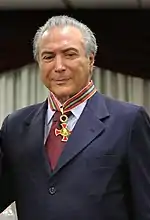
In 1968, Temer began teaching constitutional law at PUC-SP, where he also taught civil law and was director of the postgraduate department and of the Brazilian Institute Of Constitutional Law as well as a member of the Ibero-American Institute of Constitutional Law.
Publications
Temer published four major works in constitutional law. His most famous book is Elements of Constitutional Law, published in 1982, which sold over 240,000 copies.[15] The book focuses on the organization of the Brazilian state, especially on the separation of powers.
His 2006 book Democracy and Citizenship highlighted the relevance of law and included some of his speeches as a federal deputy. In his works, he showed himself to be a supporter of parliamentarism and a political recall system, while opposing economic interventionism and tax increases.[16]
However, he considered himself a writer only in 2013, when he published Anonymous Intimacy, a book of poems. It consists of 120 poems, many of which were written on napkins during his plane trips between São Paulo and Brasílla.[16] Temer said writing poems helped him recover from the "barren arena of legislative politics".[17]
Political career
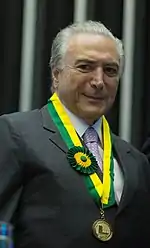
Beginning in 1987 Temer served six consecutive terms in the Chamber of Deputies,[18] and on three separate occasions served two-year terms as president of the Chamber (1997–1998, 1999–2000 and 2009–2010).[6] Temer was also a member of the 1988 constituent assembly, which promulgated the current Constitution of Brazil.[6] He became President of the Brazilian Democratic Movement Party (PMDB), the largest party in Brazil.[18]
Temer was the second Vice President of Lebanese origin, after José Maria Alkmin. His family originates from the town of Btaaboura in Koura District, near Tripoli in northern Lebanon.[19][20]
Investigations
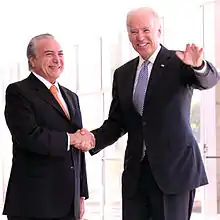
In 2016, he was accused of having a lobbyist bribe others between 1997 and 2001 in ethanol deals through state-run oil company Petrobras. He was also under investigation for accepting more than $1.5 million in funds from construction company Camargo Correa, which works with Petrobras. Spreadsheets from the construction company listed Temer's name 21 times. The numbers next to his name added up to $345,000, which authorities alleged were bribes and which Temer said were legal campaign contributions.[21][22] The claim was dismissed by the courts, and Temer denied any wrongdoing.[21] Temer has also been accused of electoral fraud; in 2016, he allegedly solicited $2.9m in illegal campaign donations in 2014. Part of investigation is into whether bribe money helped fund the 2014 campaign that saw Dilma Rousseff re-elected president with Temer as her running mate; Temer also denies this.[23]
In 2017 Brazil's federal police said that investigators have found evidence the president received bribes to help businesses. A released video made by investigators shows Rodrigo Rocha Loures, former Temer aide, carrying a suitcase filled with about $150,000 in cash allegedly being sent from JBS S.A. to the president.[24]
In 2018, Brazilian Supreme Court Justice ordered Temer be included in an ongoing investigation into $3.07 million in illicit funds his Brazilian Democratic Party allegedly received from construction firm Odebrecht.[25]
Role in the impeachment process against Dilma Rousseff
In 2015 and 2016, Temer was involved in controversy as Dilma Rousseff's impeachment process unfolded. In December 2015, Temer sent a letter to the president complaining about his distance from government decisions. The letter began with the Latin proverb "Verba Volant, Scripta Manent" (spoken words fly, written words remain). Temer described the communication as a "personal" unburdening about various complaints against the president. He said Rousseff had made him look like a "decorative" vice president, not an active one, despite having been invited to support her government several times in the dialogue with Congress, a role he only accepted in 2015.
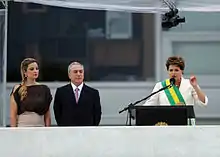
The letter was commented on and mocked in Brazilian social media, with images depicting the vice president as a Christmas decoration, making fun of his use of Latin, and photos purporting to show the president laughing as she read the missive, among many other things. The president's office had no immediate comment on the images,[26] but Rousseff condemned him as a traitor to her administration.[27]
In April 2016, an audio file of Temer was leaked to the media. In it, Temer speaks as if the impeachment process had already ended and he was the new president.[28] "I don't want to generate false expectations," Temer said on the recordings, which were first published by Folha de S.Paulo on 23 May. "Let's not think that a possible change in government will solve everything in three or four months."
The leak came just hours before a special lower house committee was scheduled to vote whether to back the request to impeach the president, generating complaints and accusations of treachery and lack of support from a vice president conspiring against the elected president. Temer alleged it was sent incorrectly to a WhatsApp group of his party's representatives in Congress.
First impeachment attempts
.jpg.webp)
As investigations following Operation Car Wash grew, allegations against members of the Brazilian Democratic Movement Party (PMDB) began to arise. In December 2015, impeachment proceedings toward Temer were filed, though his fellow party member, President of the Chamber of Deputies Eduardo Cunha, blocked the movement and instead allowed impeachment proceedings against President Rousseff.[29]
After a Supreme Court judge, Judge Mello, ruled Cunha's actions wrong, he suggested that Temer should face impeachment proceedings.[29] Another attempt to impeach Temer[30] began with the decision on 6 April 2016, by the president of the Chamber of Deputies, Eduardo Cunha, to form a commission for termination analysis of liability for crime offered by attorney Mariel M. Marra. Four other requests for impeachment were presented to Cunha.[31]
Cunha, who was third in line for the presidency behind Temer, faced scrutiny for alleged money laundering uncovered in Operation Car Wash.[29] On 5 May 2016, Cunha was suspended as speaker of the lower house by Brazil's Supreme Court due to allegations that he attempted to intimidate members of Congress, and obstructed investigations into his alleged receipt of bribes.[32][33]
On 17 May 2016, Justice Marco Aurélio Mello allowed the impeachment request to enter the agenda of the Supreme Federal Court plenary session.[34]
Acting president
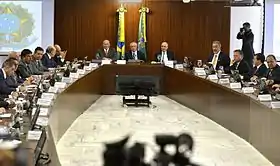
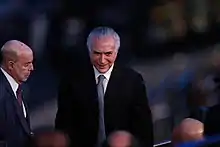
In the early hours of 12 May 2016, the Federal Senate voted to accept Rousseff's impeachment. Per the Brazilian Constitution, Rousseff's powers were suspended and Temer became acting president. Temer was to serve as acting president for up to 180 days while the Senate decided whether to convict Rousseff and remove her from office, which would make Temer president for the remainder of her term, or to acquit her of crimes of responsibility charges and restore her presidential powers. Temer was awaiting a decision from the Supreme Federal Court to start an impeachment process against him.
On his first day as acting president, Vice President Temer appointed a new cabinet, reducing the number of ministries from 31 to 22. Women's rights and Afro-Brazilian rights activists criticized the fact that all of the appointed ministers were white men, for the first time since 1979.[35][36]
On 2 June 2016, Temer received an eight-year ban from running for office after being convicted of violating election laws. This effectively ended any chance of Temer running for a full term as president in the 2018 election.[37] It can be argued that he was already ineligible to run in 2018 in any event. Under the Constitution, the vice president becomes acting president whenever the president travels abroad. Due to the manner in which the Constitution's provisions on term limits are worded, whenever a vice president serves as acting president for any reason, it counts toward the limit of two consecutive terms.
As acting president, he opened the 2016 Summer Olympics held in Rio de Janeiro on 5 August 2016 and the 2016 Summer Paralympics on 7 September of the same year.
President of Brazil
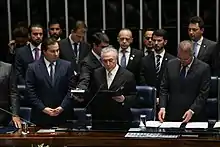
On 31 August 2016, the Senate voted to convict Rousseff, thereby removing her from office and making Temer President of Brazil. He would serve out the balance of Rousseff's second term, which finished on 1 January 2019.[38] The vice-president position became vacant, and the President of the Chamber of Deputies acts as the first constitutional substitute during his term.[39] On 7 September 2016, he opened the 2016 Summer Paralympics in Rio amid massive booing from the spectators.
In October 2016, the Constitution of Brazil was amended by deputies[40] to cap public spending, effectively frozen for twenty years, adjusted for inflation only. This measure was the subject of both praise and criticism among the Brazilian middle-class.[41]
In November 2016, Marcelo Calero, Temer's former Minister of Culture, resigned, stating that Temer had pressured him to help an ally, government secretary Geddel Vieira Lima, who had invested in a development that was being delayed by a heritage preservation measure by allowing construction to go ahead in spite of said measure. Vieira Lima resigned on 25 November 2016, and opposition leaders stated that they would seek President Temer's impeachment over this incident.[42] Temer denied the corruption allegations but admitted talking to Calero about the project.[43]
In December 2016, Marcelo Odebrecht confirmed paying bribes to President Temer.[44]
In March 2017, Temer decided to move to the vice presidential residence again. He had recent problems with the Brazilian Historical Heritage Institute due to the architectural changes he made to the Presidential Palace.[45][46] In an interview to the Brazilian news magazine Veja he mentioned he could not sleep in the "ample rooms" and questioned the possibility of ghosts.[47][48][49][50][51][52]
On 28 April 2017, trade unions called for a general strike against the pension and labor reforms proposed in his government,[53] which failed in many points, especially because the lack of interest of most of the population. Except in state capitals and major cities, in which there were shutdowns of various public services, in most places the strike was restricted to marches, or simply nothing happened.[54] The government announces the abolition of "popular pharmacies" for the summer of 2017. Created in 2004 under the presidency of Lula, they allowed the most disadvantaged to obtain low-cost medicines.[55]
On 16 February 2018, Temer signed a law aimed at tackling the organised crime element in Rio de Janeiro, transferring full control of security to the military. The military will reportedly remain in control of security until 1 January 2019.[56] The next day, Temer suggested establishing a Ministry of Public Security in the near future.[57]
According to data from the Brazilian Institute of Geography and Statistics, extreme poverty increased by 11 per cent in 2017, while inequalities also increased again (the Gini index rose from 0.555 to 0.567). The reduction in the number of Bolsa Família beneficiaries decided by the government is the main cause, according to the study.[58]
Second impeachment attempt
On 17 May 2017, secretly taped recordings leaked by O Globo, a leading national newspaper, reveal the President discussing hush money pay-offs with Joesley Batista, the businessman who runs the country's biggest meat-packing firm JBS,[59][60][61][62] prompting talk of trying again to impeach him.[63][64] On Wednesday 24 May 2017, while thousands of angry demonstrators marched towards Congress demanding Temer's resignation and immediate direct presidential elections, Temer sought to suppress a revolt within his own party.[65][66]
_04.jpg.webp)
Overwhelmed by protests, Temer deployed federal troops to the capital.[67][68] Many photographs and testimonials taken during the protest show police violence, and officers shooting at demonstrators during the manifestation.[69] President Temer's refusal to resign is making him increasingly unpopular and has provoked not only a political stalemate but also uncertainty, plunging the country into crisis and amplifying the worst recession in its history.[5][70][71]
On 9 June 2017, the Brazilian Superior Electoral Court voted 4–3 to acquit Temer and Rousseff of alleged illegal campaign funding in the 2014 election, thus allowing him to stay in office.[72][73] Former Odebrecht Vice President Marcio Faria da Silva said in testimony given as part of a plea bargain that Temer asked him at a meeting to arrange a $40 million payment to Temer's party, the Brazilian Democratic Movement Party (PMDB). Faria said he met with Temer at his law office, and that speaker of the lower house Eduardo Cunha and Congressman Henrique Eduardo Alves were also present. The payment represented a 5% commission on a contract Odebrecht was seeking with the state-run oil company Petrobras, Faria said. Supreme Court Justice Luiz Edson Fachin made this and other testimony public, and ordered an investigation of more than 100 politicians implicated in bribes and kickbacks at state-run companies, particularly Petrobras.[74]
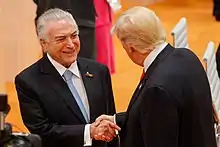
Criminal charges
On 26 June 2017, Temer was charged by Prosecutor-General Rodrigo Janot with accepting bribes and Janot delivered the charges to the Supreme Federal Court.[75] The lower house must vote on the charges, which stem from allegations that he took $5 million in return for clearing up JBS tax problems and facilitating a loan. Temer still has the support of Rodrigo Maia, who replaced Cunha as speaker of the lower house, and has the power to accept or shelve a petition for impeachment. Temer is thought to have the votes to remain in office, but to be vulnerable to a loss of support if repeated votes become necessary. Temer twice changed his justice minister in 2017.[4][76] The Federal Police (PF) have recommended that Temer also be charged with obstruction of justice.[75] Funding reductions have forced the Federal Police to dismantle the workgroup, leaving some investigations incomplete, and Justice Minister Torquato Jardim tried, unsuccessfully, to change PF leadership. A series of legislative initiatives focus on amnesty and changes to the code of criminal procedure.[77]
In June 2017 Temer's approval rating stood at 7%, the lowest for any President of Brazil in more than thirty years.[4] In a survey conducted by the IBOPE institute between 24 and 26 July 81% of Brazilians favored the indictment of the President.[78] On 2 August, lawmakers in the lower house in Congress voted not to refer the case against the scandal-plagued President to the supreme court, which has the power to try him. Observers and the population state that the move to shield Temer only further undermines the credibility of Brazil's political and electoral system.[79][80][81]
On 21 March 2019, Temer was arrested during the investigation into Operation Car Wash.[82] On March 25, a habeas corpus was issued on behalf of Temer by desembargador Antonio Ivan Athié.[83]
Devastation of the Amazon rainforest
On August 22, 2017, Temer issued a decree to dissolve the "Reserva Nacional do Cobre e Associados" (Renca) Amazonian reserve in Brazil's northern states of Pará and Amapá, measuring 4 million hectares to allow mining by private companies and the conversion of forest into crops for agro-business companies.[84] After widespread criticism, the decree was revoked on 26 September.[85]
Foreign visits as president
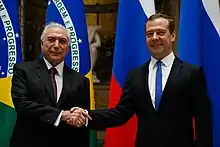
| Country | Date(s) | City | Type |
|---|---|---|---|
| 2–5 September 2016 | Hangzhou, Shanghai | Working Visit[86] | |
| 18–21 September 2016 | New York City | Working Visit | |
| 3 October 2016 | Buenos Aires | State Visit | |
| 3 October 2016 | Asunción | State Visit | |
| 15–17 October 2016 | Goa | Working Visit | |
| 18–19 October | Tokyo | State Visit | |
| 10 January 2017 | Lisbon | State Visit | |
| 20–22 June 2017 | Moscow | State Visit[87] | |
| 22–23 June 2017 | Oslo | State Visit | |
| 7–8 July 2017 | Berlin | Working Visit | |
| 21 July 2017 | Ciudad de Mendoza | Working Visit | |
| 31 August–4 September 2017 | Beijing, Xiamen | Working Visit | |
| 18–21 September 2017 | New York City | Working Visit | |
| January 19–26 | Davos | Working Visit | |
| 11 March 2018 | Valparaíso | Working Visit | |
| 13–14 April 2018 | Lima | Working Visit | |
| 18 June 2018 | Asunción | Working Visit | |
| 17–18 July 2018 | Sal | Working Visit | |
| 23–24 July 2018 | Puerto Vallarta | Working Visit[88] | |
| 25–27 July 2018 | Johannesburg | Working Visit[89] | |
| 25 September–1 October 2018 | New York City | Working Visit | |
| 21 November 2018 | Santiago | Working Visit[90] |
Polls
In an Ibope survey in September 2016, after approximately a month of President Temer's administration, 39% of Brazilians rated his administration "bad or terrible", while 14% considered it "great or good". 2,002 people were heard between 20 and 25 September, and the margin of error was two percentage points.[91]
The share of Brazilians who found his administration bad or very bad rose to 82 percent in June 2018, the most of any president since the nation's return to democracy in 1985, Datafolha showed.[92]
Personal life
.jpg.webp)
Raised by Maronite parents, Temer considers himself a Roman Catholic.[93]
Temer and his first wife Maria Célia Toledo had three daughters: Luciana (1969), Maristela (1972), and Clarissa (1974). Temer is also father to Eduardo (born in 1999 in London) with journalist Érica Ferraz.[94][95]
In 2002, Marcela Tedeschi (born in 1983) accompanied her uncle Geraldo, a Paulínia municipal employee, to the annual political convention of the Brazilian Democratic Movement Party (PMDB). While there, Marcela met Michel Temer, a politician forty-three years her senior.[96] The couple married on 26 July 2003, in a small ceremony.[97] In 2009, Marcela graduated with a law degree from Fadisp, a private school in São Paulo. In an interview, Marcela says that she never took the licensing exam because of the birth of the couple's son Michel also known by his nickname "Michelzinho".[98][99]
Awards and decorations
Below is a selected list of awards Temer has received:[100]
| Award or decoration | Country | Year | Note | |
|---|---|---|---|---|
| Grand Cross of Dannebrog | 1999 | Contribution to the arts, sciences or business life or for those working for Danish interests | ||
| Knighthood of the Order of Prince Henry (Grand Officer) | 1998 | Exceptional and outstanding merit for Portugal and its culture | ||
| Legion of Honor | 1998 | French order of merit | ||
See also
References
- Watts, Jonathan (12 May 2016). "Dilma Rousseff suspended as senate votes to impeach Brazilian president". The Guardian. ISSN 0261-3077. Retrieved 3 September 2016.
- "Brazil impeachment: New leader Temer calls for trust". BBC News. British Broadcasting Corporation. 13 May 2016. Retrieved 13 May 2016.
- Magalhaes, Luciana; Jelmayer, Rogerio (31 August 2016). "Michel Temer Seeks New Start as Brazil's President". The Wall Street Journal. ISSN 0099-9660. Retrieved 3 September 2016.
- Phillips, Dom (26 June 2017). "President Michel Temer of Brazil Is Charged With Corruption". The New York Times. Retrieved 23 July 2017.
- Romero, Simon (26 May 2017). "Their Government in Chaos, Brazilians Fear the Joke Is on Them". The New York Times. Retrieved 28 May 2017.
- "Biografia – Michel Temer, presidente da República". Portal do Planalto (in Portuguese). 12 May 2016.
- Arias, Juan (10 April 2015). "O cardeal Temer". El País Brasil (in Portuguese). Retrieved 2 February 2017.
- Daniel, Isaura (25 March 2013). "Os planos de Michel Temer para o mundo árabe". ANBA.com.br. Agência de Notícias Brasil-Árabe. Archived from the original on 1 July 2016. Retrieved 26 April 2016.
- "Conciliador, 'charmosão' e 'mordomo de filme de consternação': afinal, quem é Michel Temer". Entretenimento bit. 30 March 2016. Retrieved 26 April 2016.
- Bercito, Diogo (14 June 2015). "Origem de políticos brasileiros, Líbano tem rua com nome de Michel Temer". Folha de S.Paulo (in Portuguese). Grupo Folha. Retrieved 2 May 2016.
- Ceolin, Adriano; Motta, Severino. "Agora com Dilma, Temer quase foi vice de Serra". Último Segundo. Retrieved 22 January 2017.
- Rodas, Sérgio. "Se houver impeachment, Michel Temer será 22º advogado a presidir o Brasil". Consultor Jurídico (in Portuguese). Retrieved 22 January 2017.
- Cappelletti, Milton. "Michel Temer, o paciente. Quem é o sucessor de Dilma Rousseff". Observador (in Portuguese). Retrieved 23 January 2017.
- "Vilarejo libanês do 'filho Michel Temer' segue igreja ortodoxa grega". Folha de S.Paulo. Grupo Folha. 8 May 2016. Retrieved 2 February 2017.
- Guimarães, Thiago (31 March 2016). "Conheça Temer, poeta chamado de 'charmosão' e de professor 'bonzinho'". Folha de S.Paulo (in Portuguese). Grupo Folha. Retrieved 23 January 2017.
- "Livros revelam posições de Temer, que também se arriscou na poesia". Consultor Jurídico (in Portuguese). Retrieved 23 January 2017.
- "Michel Temer lança livro de poesia em São Paulo". www.faditu.com.br (in Portuguese). Archived from the original on 1 June 2016. Retrieved 23 January 2017.
- Cantanhéde, Eliane (1 November 2010). "Líder do PMDB, Temer terá mais força que vices de FHC e de Lula" [As leader of the PMDB, Temer has more power than the vice presidents of Fernando Henrique Cardoso and Lula]. Folha de S.Paulo (in Portuguese). Grupo Folha. Archived from the original on 11 May 2016.
- Dyke, Joe (2 July 2014). "The most powerful Lebanese person alive". Executive Magazine. Archived from the original on 11 May 2016.
- Bercito, Diogo (4 May 2015). "Politicians of Lebanese descent flourish in Brazil". The Daily Star. Lebanon. Archived from the original on 5 May 2015.
- "2 men in line for Brazilian presidency accused of corruption". Associated Press. 2 men in line for Brazilian presidency accused of corruption. 11 May 2016.
- "A Brazilian Cabinet member was just caught on tape plotting to take down the president". Vox. Retrieved 4 June 2018.
- Phillips, Dom (12 December 2016). "Brazil president Michel Temer accused of soliciting millions in illegal donations". The Guardian. Retrieved 4 June 2018.
- "Brazil: police claim to have evidence President Michel Temer received bribes". the Guardian. Associated Press. 21 June 2017. Retrieved 4 June 2018.
- "Brazil: police claim to have evidence President Michel Temer received bribes". The Guardian. Associated Press. 21 June 2017. Retrieved 4 June 2018.
- Trevisani, Paulo; Jelmayer, Rogerio (8 December 2015). "Brazil Vice President Sends Letter Criticizing President Dilma Rousseff". Wall Street Journal. Retrieved 17 April 2016.
- Romero, Simon (21 April 2016). "Brazil's Vice President, Unpopular and Under Scrutiny, Prepares to Lead". The New York Times. Archived from the original on 11 May 2016.
- Edgerton, Anna; Colitt, Raymond (11 April 2016). "Leaked Brazil Tape Shows VP Temer Practicing Unity Address". Bloomberg. Archived from the original on 11 May 2016.
- "Brazil Vice-President Michel Temer could face impeachment". BBC News. British Broadcasting Corporation. 5 April 2016. Retrieved 11 April 2016.
- Ramalho, Renan (5 April 2016). "STF manda Cunha dar andamento a pedido de impeachment de Temer". G1 (in Portuguese). Grupo Globo. Retrieved 5 April 2016.
- Calgaro, Fernanda (5 April 2016). "Cunha rejeita pedido de impeachment de Temer feito por Cid Gomes". G1 (in Portuguese). Grupo Globo. Retrieved 5 April 2016.
- Falcão, Márcio (5 May 2016). "Teori afasta Eduardo Cunha do mandato na Câmara". Folha de S.Paulo (in Portuguese). Grupo Folha. Retrieved 21 May 2016.
- Watts, Jonathan (5 May 2016). "Speaker of Brazil's lower house Eduardo Cunha suspended". The Guardian. Retrieved 21 May 2016.
- "Pedido de impeachment de Temer é liberado para entrar na pauta do STF". Estado de Minas (in Portuguese). Diários Associados. 17 May 2016. Retrieved 18 May 2016.
- Sims, Shannon (12 May 2016). "Brazil's New President Michel Temer Fills Cabinet With Only Men". Forbes. Retrieved 4 September 2016.
- Koren, Marina (25 May 2016). "Who's Missing From Brazil's Cabinet?". The Atlantic. Retrieved 4 September 2016.
- Greenwald, Glenn (3 June 2016). "Credibility of Brazil's Interim President Collapses as He Receives 8-Year Ban on Running for Office". The Intercept. Retrieved 10 September 2016.
- "Brazil's Rousseff ousted by Senate, Temer sworn in". Reuters. 1 September 2016. Retrieved 2 February 2017.
- "Constitution of the Federative Republic of Brazil, article 80". Archived from the original on 15 July 2017.
- "Le Brésil gèle ses dépenses publiques sur 20 ans". RFI (in French). Radio France Internationale. 11 October 2016. Retrieved 2 February 2017.
- "Técnicos e parlamentares alertam para desmonte do Estado com PEC 241". Rede Brasil Atual (in Portuguese). Retrieved 2 February 2017.
- Romero, Simon (25 November 2016). "Brazil's President, Michel Temer, Embroiled in New Corruption Scandal". The New York Times. ISSN 0362-4331. Retrieved 25 November 2016.
- "Brazil president Michel Temer accused of corruption". BBC News. British Broadcasting Corporation. 25 November 2016. Retrieved 25 November 2016.
- "Odebrecht confirms paying bribes to President Michel Temer". plus55. 14 December 2016. Retrieved 2 February 2017.
- "Iphan manda Temer tirar rede de proteção do Alvorada". Veja.com (in Portuguese). Grupo Abril. 9 March 2017. Retrieved 13 March 2017.
- Monteiro, Tânia; Rosa, Vera. "Iphan manda governo tirar rede de proteção do Alvorada". Estadão (in Portuguese). Grupo Estado. Retrieved 13 March 2017.
- ""Será que tem fantasma?", diz Temer comentando saída do Palácio da Alvorada". Jornal do Brasil (in Portuguese). Retrieved 13 March 2017.
- "Temer, o reformista". Veja.com (in Portuguese). Grupo Abril. 11 March 2017. Retrieved 13 March 2017.
- "Em entrevista, Temer diz que deixou o Palácio da Alvorada por medo de fantasma: "Não conseguia dormir"". Portal Fórum. 12 March 2017. Retrieved 13 March 2017.
- "Temer rechaza vivir en palacio presidencial por ¿fantasmas?". El Universal (in Spanish). Retrieved 13 March 2017.
- "Michel Temer se muda del palacio presidencial por miedo a los fantasmas y estallan las burlas". Clarín (in Spanish). Buenos Aires. Retrieved 13 March 2017.
- John, Tara. "Brazil's President Moved Out Because of 'Ghosts'". Time. Retrieved 13 March 2017.
- "Grève générale au Brésil". Le Figaro (in French). Retrieved 19 May 2017.
- "Governo Temer tem aprovação de 9% e reprovação de 61%, diz Datafolha". G1 (in Portuguese). Grupo Globo. Retrieved 22 August 2017.
- "Governo Temer anuncia fim de todas as Farmácias Populares até agosto". 7 June 2017.
- "Brazil's Military Is Put in Charge of Security in Rio de Janeiro". ERNESTO LONDONO and SHASTA DARLINGTON. The New York Times. 16 February 2018. Retrieved 22 February 2018.
- "Brazi's Temer Announces new security ministry to combat violence". New Vision. Retrieved 22 February 2018.
- "Pobreza extrema aumenta 11% no último ano; economistas culpam trabalho informal". Brasil de Fato.
- "A very meaty scandal. Leaked recordings are trouble for Michel Temer". The Economist. Retrieved 19 May 2017.
- Watts, Jonathan (18 May 2017). "Brazil: explosive recordings implicate President Michel Temer in bribery". The Guardian. Retrieved 19 May 2017.
- "Brazil president taped discussing pay-off for witness in graft probe: O Globo". Reuters. Retrieved 19 May 2017.
- Phillips, Dom (17 May 2017). "Brazil President Endorsed Businessman's Bribes in Secret Tape, Newspaper Says". The New York Times. Retrieved 28 May 2017.
- "Brazil Graft Probe Targets President, Markets Drop Amid Impeachment Talk". Wall Street Journal. Retrieved 19 May 2017.
- "Brazilian Bar Association Seeks Impeachment Of President Temer". Channels Television. Retrieved 28 May 2017.
- Shinohara, Gabriel; Gamarski, Rachel (25 May 2017). "Ministry Torched as Brazil's Temer Faces Violence, Party Mutiny". Bloomberg Politics. Retrieved 25 May 2017.
- Simon Romero (19 May 2017). "Scandal in Brazil Raises Fear of Turmoil's Return". New York Times.
- "Brazil protests: Ministerial building set on fire during clashes". BBC News. British Broadcasting Corporation. Retrieved 25 May 2017.
- Romero, Simon; Phillips, Dom (24 May 2017). "Brazil's President Deploys Federal Troops to Quell Protests". The New York Times. Retrieved 25 May 2017.
- "Brazil police accused of shooting at anti-government protesters". The Guardian. The Associated Press. 25 May 2017. Retrieved 28 May 2017.
- Cowie, Sam. "Brazil's beleaguered President Temer refuses to resign". Al Jazeera. Retrieved 28 May 2017.
- "Coalition allies debate succession to Brazil's Temer". Financial Times. Retrieved 28 May 2017.
- "The Latest: Brazil's electoral court keeps Temer in office". ABC News. American Broadcasting Company. 9 June 2017. Retrieved 9 June 2017.
- "Brazil electoral court dismisses case that could have ousted president". Reuters. 9 June 2017. Retrieved 18 June 2017.
- Paraguassu, Lisandra; Fonseca, Pedro (13 April 2017). "Brazil's Temer calls $40 million Odebrecht bribe accusation 'a lie'". Reuters. Retrieved 22 July 2017.
- "Brazil's top prosecutor charges President Michel Temer with corruption". CNBC. Reuters. 27 June 2017.
- Watts, Jonathan (27 June 2017). "Brazil faces fresh turmoil after President Temer charged with corruption". The Guardian. Retrieved 22 July 2017.
- Gurovitz, Helio (25 July 2017). "O futuro incerto da Lava Jato" [The Uncertain Future of Lavo Jato]. G1 (in Portuguese). Grupo Globo. Retrieved 25 July 2017.
- "81% dos eleitores defendem processo contra Temer, diz pesquisa Ibope". UOL Notícias Política. Grupo Folha. 31 July 2017. Retrieved 3 August 2017.
- "Brazil's congress decides not to put Michel Temer on trial". The Economist. 3 August 2017. Retrieved 3 August 2017.
- Phillips, Dom (3 August 2017). "Brazil's president keeps job as congress votes against corruption charges". The Guardian. Retrieved 3 August 2017.
- "The Twilight of Brazil's Anti-Corruption Movement". The Atlantic. 28 July 2017. Retrieved 3 August 2017.
- "Brazilian ex-President Temer arrested". 21 March 2019. Retrieved 21 March 2019.
- "TRF2 determines release of ex-President Michel Temer, Moreira Franco, Colonel Lima and 5 more". 25 March 2019. Retrieved 25 March 2019.
- "Watts, Jonathan (24 August 2017). "Brazil abolishes huge Amazon reserve in 'biggest attack' in 50 years". The Guardian. Retrieved 6 November 2017.
- "Renca: governo revoga decreto que liberava mineração em Renca: governo revoga decreto que liberava mineração em reserva na AmazôniaRenca: governo revoga decreto que liberava mineração em reserva na Amazôniareserva na Amazônia". O Globo (in Portuguese).
- Globo, Filipe Matoso e Roniara CastilhosDo G1 e da TV; Brasília, em (31 August 2016). "Temer embarca para a China e participará da Cúpula do G20". Processo de Impeachment de Dilma.
- "Russian-Brazilian talks". President of Russia.
- "Presidents Of Brazil, Mexico Discuss Expansion Of Bilateral Trade". 25 July 2018.
- "Temer's Final BRICS Summit Is a Golden Opportunity for Brazil".
- "Gob.cl - Article: Presidents Piñera And Temer Sign Chile-Brazil Free Trade Agreement". Government of Chile.
- Anthony Boadle / Lisandra Paraguassu (4 October 2016). "Little improvement in Temer government's popularity: Brazil poll". Reuters. Retrieved 4 October 2016.
- Gerson Freitas Jr (10 June 2018). "Far-Right Jair Bolsonaro Edges Ahead in Brazil Opinion Poll" [Lebanese village of 'son Michel Temer' follows Greek Orthodox church] (in Portuguese). Bloomberg.
- "Vilarejo libanês do 'filho Michel Temer' segue igreja ortodoxa grega". Folha de S.Paulo. 8 May 2016. Retrieved 4 May 2018.
- "Foco no poder e, agora, na própria biografia". Estadão. 12 May 2016. Retrieved 4 May 2018.
- "Filho de brasileiro nasce no exterior e fica sem nacionalidade". Folha de S.Paulo. 26 March 1999.
- Linhares, Juliana. "Marcela Temer: bela, recatada e "do lar" | VEJA.com". VEJA.com. Retrieved 16 May 2016.
- "Foi uma atração forte". IstoÉ Gente. 11 August 2003. Retrieved 21 April 2016.
- "Para Marcela Temer, diferença de idade para o marido não importa". Estadão. 3 January 2011. Retrieved 21 April 2016.
- "Entenda a polêmica após matéria com perfil de Marcela Temer". Diário Catarinense. 20 April 2016. Retrieved 21 April 2016.
- "Presidentes da Câmara dos Deputados – República – Michel Temer". Portal da Câmara. Retrieved 7 November 2017.
External links
| Wikimedia Commons has media related to Michel Temer. |
- "Biography – Michel Temer, President of the Republic". Presidency of the Republic of Brazil.
- "Vice-Presidente". Presidéncia da República Federativa do Brasil (in Portuguese). Archived from the original on 28 February 2014. Official biography and portrait as Vice President
| Political offices | ||
|---|---|---|
| Preceded by Luís Eduardo Magalhaes |
President of the Chamber of Deputies 1997–2001 2009–2010 |
Succeeded by Aécio Neves |
| Preceded by Arlindo Chinaglia |
Succeeded by Marco Maia | |
| Preceded by José Alencar |
Vice President of Brazil 2011–2016 |
Vacant Title next held by Hamilton Mourão |
| Preceded by Dilma Rousseff |
President of Brazil 2016–2018 |
Succeeded by Jair Bolsonaro |
| Party political offices | ||
| Preceded by Jader Barbalho |
President of the Brazilian Democratic Movement Party 2001–2016 |
Succeeded by Romero Jucá |
| Preceded by Rita Camata (2002) |
Brazilian Democratic Movement Party nominee for Vice President of Brazil 2010 · 2014 |
Succeeded by Germano Rigotto |
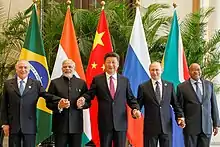



.jpg.webp)

